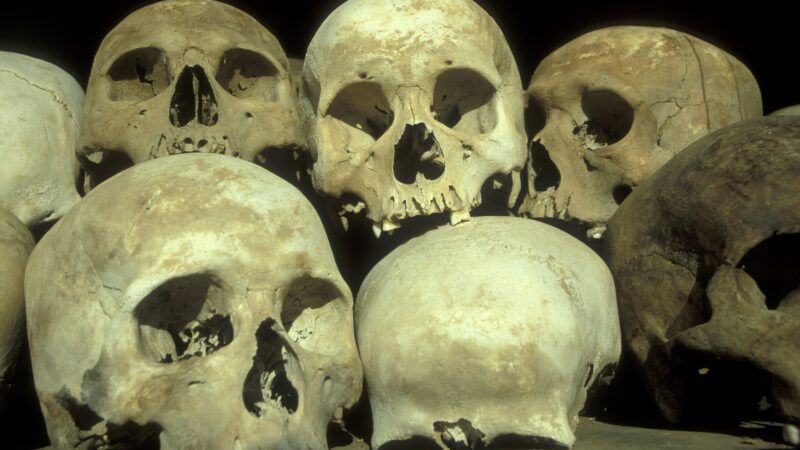Pol Pot's Atrocities Still Matter, 45 Years After Khmer Rouge's Fall
Like many horrors throughout history, they were rooted in radical ideas aimed at implementing some utopian vision.

Forty-five years ago last Sunday, Vietnamese troops seized Phnom Penh and ended Cambodia's 45-month reign of terror known as the "killing fields." Under the leadership of Pol Pot, the Khmer Rouge government implemented policies—forced labor, resettlements, torture, starvation—that led to the death of 1.7-to-3 million people, or at least 20 percent of the nation's population. The regime destroyed the country, caused untold suffering, and left permanent scars.
Painful as it is, we should not let these grim anniversaries go unremembered. For context, imagine a "political experiment" that obliterated our society and left a quarter of our 331-million population dead. It's inconceivable. As the son of a Nazi concentration camp survivor and grandson of peasants who fled Russian pogroms, I've always been fascinated by a simple question: What are the conditions that lead to such horrors?
The obvious answer is these horrors always are rooted in ideas, typically radical ones that try to implement some utopian vision. They typically are the work of governments. Large swaths of the population take part—some willingly, others by force. The Cambodian revolution wasn't spontaneous. Its leaders honed their philosophy while studying in Paris. And one usually finds intellectuals behind crazy notions. As the saying goes, "Ideas have consequences"—and they're often tragic.
Cambodia's leaders sought to create an idyllic and classless agrarian society, one that harkened to the Angkor Empire from the 800s. "They wanted all members of society to be rural agricultural workers rather than educated city dwellers, who the Khmer Rouge believed had been corrupted by western capitalist ideas," according to the Holocaust Memorial Day Trust. Their philosophy echoed Mao Zedong, whose efforts to remake China led to unimaginable horrors.
For half of my life, the Cold War and the threat of communism was an ever-present feature. Time moves on, so it's no surprise that fewer Americans remember the widespread fear that totalitarianism might dominate. Communist regimes at one point controlled 30 percent of the world's population. Despite this history, a shocking 2019 poll found more than a third of U.S. millennials approve of communism, with only 57 percent preferring the Declaration of Independence to the Communist Manifesto, according to a report in the Independent.
In 1999, the "Black Book of Communism" tried to detail the number of civilian deaths caused by the world's communist regimes—not deaths caused amid wars and civil strife, but direct massacres from the kind of policies so efficiently carried out in Cambodia. The authors came up with a figure of 100 million. These deaths don't tell the entire story of fear, slavery, and repression. It's simply unfathomable that any modern American could have a view of communist regimes that were any more favorable than the views most of us hold of Nazism.
Then again, ideological narratives grab hold of people in ways that are hard to understand. So many young leftists are nurtured in a university hothouse that divvies up humanity into fixed groups of "oppressor" and "oppressed." They learned to have an endless faith in the government's ability to reorder humanity. They probably haven't been taught about what happens when officials are given unlimited powers to launch a "Great Leap Forward," create "Year Zero" or design a "New Soviet Man."
That's too bad because the reason we live such free and prosperous lives is because we live within a system that limits the government's power to take our property, throw us in prison, depopulate cities, execute us, force us onto long marches and put us in re-education camps. History proves that many people—including those who claim to have the best intentions—would do horrific things if they had such powers at their disposal. We can even point to horrors in the history of our own country, of course.
What lessons can modern Americans draw from the Cambodian nightmare? I'd suggest we show no tolerance toward grandiose social experiments of any kind (such as radically reordering society to avert a supposed climate doom) and focus instead on incrementally improving life within our current system. People get excited about big, transformative ideas even though they can upend society, yet lose interest in the nuts-and-bolts of the slow-moving democratic process. The latter can be hard work, so no wonder political radicals prefer dangerous shortcuts.
Back in Cambodia, the devastation from the 1970s still permeates the nation's politics. After Pol Pot was deposed, the country fell into a civil war that lasted until the 1990s, with an apparently unrepentant Pol Pot finally dying in exile 1998. As Time reports, many former Khmer Rouge officials remain in power and the country "still grapples with Pol Pot's brutal legacy." Cambodia's population is young, so few remember the horrors—but it still casts a pall over everything.
For the rest of us, all we can do is remember, or as author Elie Wiesel said: "For the dead and the living, we must bear witness."
This column was first published in The Orange County Register.


Show Comments (202)